HIT CHANNEL EXCLUSIVE INTERVIEW: December 2013. We had the tremendous honour to talk with a legendary musician and a fine person: Andy Latimer. Andy is the leader of Camel –a great and highly influential English band- for more than 40 years. Camel just came back to action after a 10-year break with live shows and the re-recording of their classic album, “The Snow Goose”. Read below the very interesting things he told us:
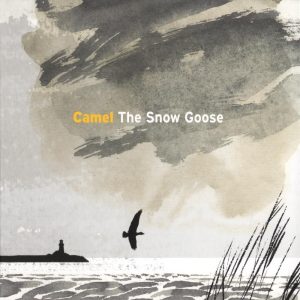 Did you enjoy the first leg of the come-back tour?
Did you enjoy the first leg of the come-back tour?
Yes, it was a wonderful, very enjoyable and quite overwhelming actually thing. It gathered people who came from all over the world and it was fantastic that they supported us. They did a fantastic job; it was just amazing. So, we really did enjoy it. It was a kind of experience that all of us we want to repeat.
Did you have to rehearse extensively for these shows?
Yes! Yes we did, because I hadn’t actually toured for 10 years. So, I had a lot of catching up to do really. You know, I wanted to tour but I would actually like to be good. We had a week’s rehearsal with just Colin (ed: Bass, bass) and Denis (ed: Clement), the drummer. Then we had a week’s rehearsal with Guy (ed: LeBlanc, keyboards) and Jason (ed: Hart, keyboards). It wasn’t a very extensive rehearsal, but the intention was that we would have a long period to rehearse, then do a short tour this year and then repeat again next year. Next year we will only have to do a four or five-day crash out to come back again.
Why did you decide to re-record “The Snow Goose” album? Didn’t you like the original recording?
There were a couple of reasons. No, I didn’t like the original pressing that Decca or Universal re-released. They re-released the package and I thought that the quality of the sound is very poor, and so I thought “Uuhh! I’m gonna come back to do “The Snow Goose” as a tour. So, maybe I could think about approaching the “Goose” again”. And then part in it, I thought it could be improved. So, I started adding just a little thing in little pieces, because I didn’t want to change it totally. I guess, you know, I can’t repeat the original version, as faithfully as I could. I can’t beat the feeling of the story and I’m pretty true to original recording. I said: “I can fix this thing a little bit, I can re-orchestrate some pieces that I thought weren’t well-orchestrated as they could be”. You know, I thought I am going to play again, so there are some things after 35 years like… I don’t know, “Preparation”. I didn’t think I wanna play the rhythm half an hour. So, one of the keyboard plugs pressed the rhythm on a loose form. We arranged it a little bit. So I did and I thought it was pretty successful because I didn’t go too far from the original.
How close is the next studio album of Camel?
I ‘m not sure when we will do it, because what happens is that we are going to tour again in March. I’m working on the material now for the next album. I ‘ve quite a lot of stuff written already but I use to take a long time anyway before I release something. We are going to tour. I think we maybe do some shows in the summer –I’m not sure about that- but if we do then that could put the new album back. So, I think the new album won’t be ready until.. the end of summer. It depends on whether we tour. If we tour a lot and do a lot of shows, then obviously the recording in the new album will be put back a bit.
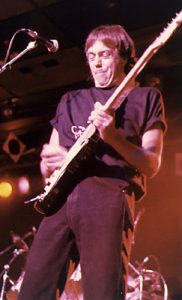 Did you write the new songs on piano or on guitar? I know you used to write on piano a lot.
Did you write the new songs on piano or on guitar? I know you used to write on piano a lot.
Yes. I did both, you know. I write a little bit on piano. I try to write more on guitar these days because I think the compositions hold together a lot better if I’m playing a guitar part. Or sometimes I write on piano if a part deserves it, if there wouldn’t be any guitar on it (laughs). So, I tend to try a lot more on guitar now.
Do you have happy memories from the Royal Albert Hall show you played on 17 October 1975?
Yes, it was an occasion. We thought that the fans deserved at least one show with an orchestra. So, doing Royal Albert Hall with an orchestra was quite an event . Everybody enjoyed it, but there were some technical problems. We didn’t have the sort of P.A’s that we have nowadays. So, the sound probably could be better, but everybody enjoyed it. It was something we all always wanted to do. We all wanted to do one show with an orchestra. Of course, it cost so much money to do. Even though we sold out Royal Albert Hall we lost money because it cost so much money to do the orchestra.
How did it happen to have Brian Eno on “Elke” song from the “Rain Dances” (1977) album?
That was through the producer, Rhett Davies. He was producing us at the time, when we were doing “Rain Dances” and he was also producing Eno. I liked a lot of Eno stuff, especially all the ambient stuff that he was doing then, so I thought: “Wow! This would a fantastic chance to re-arrange this number and get Eno through Rhett”. I asked Rhett if he would be interested in coming in and he said: “I don’t know. I ‘ll ask him” and Eno replied: “Yes, I would love to come in”. So, he came in and he worked as hard as I did on a piece (ed: “Elke”) and it was such a fabulous experience because he is a very hard-working person and very inventive too.
Could we say that “The Single Factor” was the worst studio experience for you?
The worst? No, I would say that “Breathless” (1978) is the worst experience.
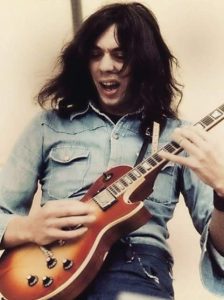 You have Camel Productions that take care of the Camel business for more than 25 years. Does the business part of Camel distract you from making more music?
You have Camel Productions that take care of the Camel business for more than 25 years. Does the business part of Camel distract you from making more music?
Ah, not really. The running of a company, yes it is distractive but Susan Hoover (ed: his wife and lyricist of Camel for more than 30 years) and her colleagues, the co-workers that she works with, run the company and leave me basically to do most of the creative work . It’s much better than being signed to a major label because you are your own boss, write your own future and play the kind of music that you want to play. Rather than have the pressure of a record company saying: “We want you to do this”. It takes a lot of time when you run your own company.
In mid ‘80s you sold your house and moved to California. Did you feel that you had no future in England?
Yes, absolutely. I mean, I already got to see two or three record companies if I could get a record deal for Camel and one of them, which was run by my old manager Max Hole, who is now head of Universal Music told me then that I was too old, he wasn’t interested in my music and basically I should give up. I got bored waiting for a record deal, I was still interested in playing my own music, and as the time went on, I developed a plan with Susan to start our own company. And the only way to really afford to do that was to sell our house and move to America. I moved to America because in America Camel was very well-received, people were very enthusiastic, had a lot of energy. It was a totally different scene than the English one. That time when I was in England nobody really interested in what I am doing. So, that’s why I moved to America. It was a big gamble to sell my house and invest the money we got to the company. Then, we started to make “Dust and Dreams”. We had no idea whether or not it would sell. But luckily, older fans came back and they loved it, and that’s how the company started.
You had many problems in the past with managers and recording labels. Do you think the current collapse of the major recording labels is a kind of justice for their corporate greed all these years?
(Laughs) Yes. You know how the big corporations are. And when the corporations go well, the music suffers. It becomes something produced by big companies, all these sorts of boy bands…
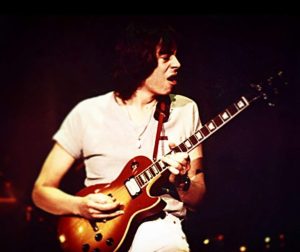 It’s like selling televisions.
It’s like selling televisions.
Yeah. Like televisions, yes (laughs). That’s terrible. It is run by big companies. It was inevitable that the big companies would start to collapse. But I think the whole industry is collapsing little by little now because people don’t want to buy music now. They don’t want to pay money for music. They gonna get it free on the Internet. They maybe pay some money to Spotify and Spotify doesn’t pay artists, so the artists is the one who don’t get the money and eventually what happens is that all these people who have very well intentions can’t create new music. It’s a problem which we still don’t know. It’s from the Internet, from Youtube. If people don’t pay for watching a show, we can’t make money. We –in the end- won’t survive. We will eventually have to stop because artists won’t make money from music. What happens is that all bands without fans cannot make music. Because they can’t make a living out of it. Because they can’t sell CDs, they can’t sell DVDs and nobody wants to pay for it. It sucks really. But luckily there are a lot of fans that will, that people of more generations who will pay for music. So, they will allow musicians keep on going for a moment.
Do you miss Peter Bardens (original Camel keyboardist-deceased)?
Yes, I miss Pete. You know, when we were working in the early days together, we had a healthy amount of respect for each other. He was the best songwriting partner that I ever had, really. I think I never had a songwriting partner since Peter left! Ι have written with some other people since then but Peter was a very easy person to work on writing stuff. Yes, I miss him.
Everyone knows that you are a perfectionist. Do you wish you were as fast as Neil Young who makes one album a year for 45 years?
I think also things would change for me with that whole momentum. When I was with Camel in the early days, we had a record company, a manager, an agent and we only had to do 40 minutes of music. So, it was quite easy for the two of us to work on new material because albums were then 40 minutes long. Now we have CDs which are 60-70 minutes long, so there is a lot more music to write. So, I don’t have that momentum and the luxury of writing stuff. I would love it. Shall write more stuff? Yes. I mean, I’m writing constantly. I have lots of stuff that I ‘ve written and keep on the shelf really without doing anything.
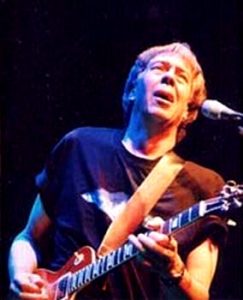 You auditioned for the role of guitarist/singer in Roger Waters’ tour in 2006. How did you learn about this possibility? Were you disappointed that you finally didn’t get the job?
You auditioned for the role of guitarist/singer in Roger Waters’ tour in 2006. How did you learn about this possibility? Were you disappointed that you finally didn’t get the job?
What happened is that Snowy White (ex-Thin Lizzy), one of the guitar players, suggested me to Roger. He said: “Don’t you get in the band Andy Latimer? I think he’s a good player”. Andy Fairweather-Low (ed: guitarist who had worked with Eric Clapton and Roger Waters) got in touch with me. We talked about things and I played a few things for Roger. Roger liked them and so I went over to play with the band and it was a really lovely experience. So, basically I couldn’t sing as high as David Gilmour and at that stage Roger wanted a singer as well as a guitar player: To do the vocal parts of David Gilmour and play exactly the same as David Gilmour. Of course I can play like Gilmour if I want to, but I think Roger detected in me that I was a little more independent. Probably, I wouldn’t do all what I was told. And I couldn’t sing as high as David Gilmour. So, Roger got Dave Kilminster who is a great player indeed and he plays exactly the same as David Gilmour. So, I wasn’t really disappointed because it was such a lovely experience and Roger is a very-very gracious and nice man to talk to and I was treated very well. And then I became very ill anyway. So, it was probably just as well I didn’t get the gig, because I wouldn’t be able to continue, because I became very ill.
Steven Wilson of Porcupine Tree told me that he would like to remix the classic Camel albums. Is it possible to let him do it?
Yes! I don’t see why not. He’s very good. He did the King Crimson stuff and he does his own stuff too. He’s very talented so.. yeah, I wouldn’t mind. I think the problem is that I don’t own almost all the classic albums, then he has to go to Universal and make sure that they would say “yes” to do it. The older stuff has some problems. I don’t mind if he wants to do it. I didn’t know it!
Many fans falsely believe that Camel belongs to the Canterbury scene. Can you make this clear one more time?
I think what happened is: When Peter (ed: Bardens, keyboards) left the band, we got Dave Sinclair and Jan Schelhaas (both keyboardists) from Caravan. From that point, this thing started to confuse people. “Camel? Has something to do with the Canterbury scene?” Don’t forget that we also used Richard Sinclair (bass), he was also with Caravan. I think that happened, people started to think that we are all from Canterbury. We are from Guildford basically, which is different area from Canterbury. And of course, we were doing the same sort of progressive material if you want to call it that, as Caravan is and not too much as Soft Machine. We supported Soft Machine quite a few times, so we were quite influenced by them, and Caravan really too. So, I can see why people get confused and think that we are a Canterbury band. We are not. I think they get confused because we used a lot of players from Caravan.
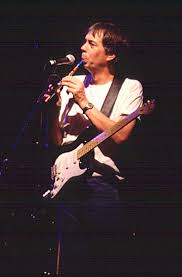 What kind of music are you listening to this period?
What kind of music are you listening to this period?
Yes, it’s an interesting question. A lot of film music. I ‘m interested in any thing of good. I listen to a lot of players. I mean, I still listen to people like Jeff Beck, and other greats from the past: Jimi Hendrix, people like Django Reinhardt, George Benson. A lot of old blues stuff; I love a lot of the new guitar players like Eric Johnson and Joe Bonamassa. The standards: people like Joni Mitchell. I still listen to things like The Beatles, The Beach Boys. Anything that is good, really.
Do you believe that punk rock movement had anything to do with the music or it was just a marketing invention? I believe the latter.
Yeah, I think it was a bit of both, though. People got fed up with these things, they get bored with people like ELP, you know Emerson, Lake & Palmer and Yes. They were becoming more and more lush, and more-more complicated. They were messing with public. What happened with the punk scene is kind of leveled all this stuff. This is something simple, this is stuff that you can play. A lot of this was very aggressive, which I didn’t like, and for me it wasn’t very musical so it wasn’t so pleasant to listen to it. But I can see why, I can see why came in. Camel just hadn’t been torn then. We just kept going. We kept playing live shows and doing things. It probably affected us a little bit but a lot of people didn’t like it. There wasn’t only the element that people wanted something new, it (ed: punk rock) wasn’t very attractive to a lot of people. But I don’t necessary think it is a bad thing. It is just what happens to music.
Did you have fun when you played in Athens in 2000? Many Greeks consider that show as the best ever in their lives!!
It was absolutely fantastic. We loved playing in Greece. When we went with one of the staff to that show in Athens, it was quite an experience. It was sold out, but there were also a couple of thousands people who were trying to get in. It was a very fantastic audience. We loved to play to the Greek people and it is something that we want to do again. I know the economic situation in Greece. It would be great to spend a little bit of joy in Greece. If we could, it would be fantastic. It was such a lovely experience back then, so yes I would love to come back.
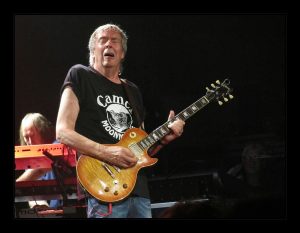 You almost did the soundtrack for “The Terminator”. What really happened?
You almost did the soundtrack for “The Terminator”. What really happened?
(Laughs) Oh, yes!!! I was playing with Anthony Phillips (ed: guitarist and founding member of Genesis). He and I, we were asked by a publisher to write it and we wrote a lot of stuff but we didn’t know what the film was about. We sent a lot of music in and they loved it. They said: “It is fantastic. We gonna use it”. And then they sent us a script, I think we saw it somewhere and we realised that it was a kind of I don’t know how to call it movie. We heard from the publisher that the director (ed: James Cameron) has chosen (ed: pause) I don’t know.. a cousin I think of his to do the music, so we never did get it.
It’s better than you didn’t do it.
I don’t know. I think Anthony and I wanted to get into the film world. We wanted to write music for films and so we would quite happy to write anything. It didn’t matter what kind the film was about, we wanted to get in the film world and write music for films. So, we would be quite happy to do it but we didn’t do it for various reasons. So, that’s what it is. Sometimes bad things happen in this life. You try but unlucky things happen.
A huge “THANK YOU” to Andy Latimer for his time and the great answers. I would also like to thank Paris Ford from Camel Productions and Ricardo Nuviala from Latimerish fansite.
Please check out the official site of the Camel Productions www.camelproductions.com .
Official Camel Productions twitter page: https://twitter.com/camel_andylat
Also check out the excellent Camel fansite www.latimerish.com


